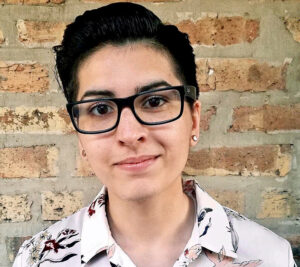Written by Ash Gillis, Ph.D. (they/them)

The summer after I finished high school, my family took a trip to Alaska that changed my life trajectory. We took a helicopter to the Mendenhall Glacier and when we arrived, a tour guide said as an aside “yeah, you know, every summer we come here and the ice retreats further and further.” Growing up in a politically conservative area of Florida, climate change wasn’t talked about. Or if it was, conversations were steeped in denial and dismissiveness. Being on that glacier felt like waking up to a new purpose I was compelled to pursue.
Yet, I had already planned to study psychology in college and understand why people do bad things. So, at the University of South Florida, I stuck with psychology and took environmental courses as electives, not totally knowing where this would take me. I worked as a psychology research assistant in a few different labs. I studied the impact of pre-trial publicity on jury decision-making, risk perceptions in substance abuse, the psychobiology of cannabis in people with schizophrenia. I found it all fascinating but none of it called to me. It wasn’t until my professor in a course on climate change pulled me aside one day after class that I had an aha moment. He found it interesting that I took his class as a psychology major and told me that there are, in fact, psychologists who study climate change. We talked about how climate change is more than an environmental problem, it’s an existential threat to life as we know it. And like all problems caused by human behavior, it takes changes in human behavior to solve them. Astounded by what he shared with me, I immediately began scouring the internet for people doing this research. I knew then that I wanted to pursue graduate studies in environmental psychology.
Because I finished college in three years, I could use leftover scholarship money for a master’s program but only if I stayed in Florida. Finding potential environmental psychology mentors at universities in Florida with terminal psychology masters programs was not exactly easy, especially nine years ago. But, ultimately, I found the perfect fit with Dr. Heather Truelove at the University of North Florida. There, I completed my master’s thesis on human perception of pro-environmental behavior, which was later published in the high-impact journal Global Environmental Change.
After finishing my master’s, I pursued my PhD in social psychology at Penn State University with Dr. Janet Swim, an exceptionally established leader in the field of environmental psychology. While there, I obtained a five-year fellowship with the public botanical garden Mt. Cuba Center where I developed, implemented, and evaluated a community-based program to encourage environmentally sustainable behavior such as planting native plants. This was one of my most rewarding life experiences. I had several other projects during my PhD and one of them involved writing a critical review of a new book called Beyond Politics: The Private Governance Response to Climate Change by two Vanderbilt Professors: Michael Vandenbergh (David Daniels Allen Distinguished Chair in the Law School and Director of the Climate Change Research Network) and Dr. Jonathan Gilligan (Associate Professor of Earth & Environmental Sciences and of Civil & Environmental Engineering). I already had a strong interest in starting research on how to communicate about climate change in ways that reduce political polarization, so after Dr. Swim and I published our review in Nature Climate Change, I pursued side projects related specifically to the role of the private sector in mitigating climate change. I subsequently published a paper on this subject in Energy Research and Social Science. When Professor Vandenbergh, Dr. Gilligan, and fellow Vanderbilt professor Dr. Mark Cohen (Justin Potter Professor of American Competitive Enterprise at Owen Graduate School of Management and Professor of Law) were recruiting for a new social science postdoc, I immediately threw my hat in the ring.
Now, I’m finishing up my first year as a Postdoctoral Research Fellow here at Vanderbilt working with a stellar interdisciplinary team on a host of projects related to the political depolarization of climate change. I feel fortunate to work with people who immensely value diversity of thought and the role of behavioral sciences in combatting climate change. Fostering new ideas and sharing our work with others in the Law School, Owen, and Department of Earth and Environmental Sciences has been especially fruitful and fun.
I’ve been thoroughly enjoying living in Nashville. As a member of the LGBTQ+ community and trans person specifically, I wasn’t sure how comfortable or safe it would feel. I was immediately welcomed by LGBTQ+ faculty, staff, and students at Vanderbilt and have quickly made many wonderful friends I hope to keep for years to come. Outside of work I enjoy hiking, playing classical piano, jamming on guitar, going to concerts, and woodworking. I’m always on the lookout for exceptional vegetarian food.